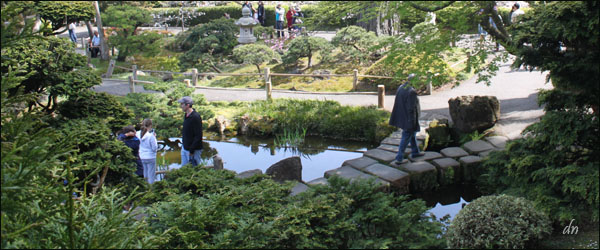
Japanese Tea Garden in San Francisco. Check.
This Japanese attraction had been on my list of places to visit ever since we did a five-hour city tour of San Francisco, back in 2010. I remember that September evening when a good chunk of the time allotted for De Young Museum and Japanese Tea Garden was eaten up by some vehicular gridlock that is not new to SF. Even walking a few blocks did not buy us the time needed to be fair to this Japanese garden. We used the few minutes we had, to step into De Young Museum’s Sculpture Garden and promised to do justice to the Japanese Tea Garden, another day.
That day came and went so now I’m taking you on a tour of the oldest Japanese-style garden in the United States. Called Japanese Tea Garden, this place has all it needs to make it a typical Japanese garden: the miniature trees, the water pools, the sand pools, the bridges, the stone lanterns, the Koi (fish) ponds and traditional Japanese plants to name a few essential elements.
Before I take you into this green oasis, let me tell you that the Japanese Tea Garden in San Francisco was created way back in 1894 as an exhibit for the California Mid-Winter International Exposition. It was initially a one-acre piece of land that served as a sample of a Japanese Village with a tea house pavilion, shoronomon (belfry gate), ni-kai-yashiki (two-story house) and an exemplary Japanese garden.
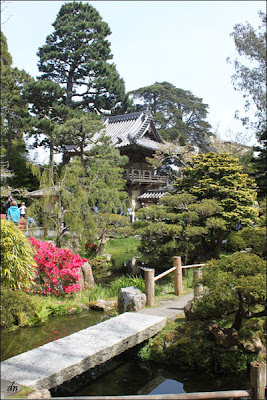
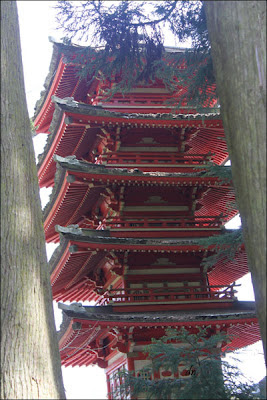
According to the recorded history of the Tea Garden, the original belfry gate and the two-story house were purchased by San Francisco’s Park Commissioners after the exposition was over. Then some of the village structures were also dismantled and removed from here. However, Makoto Hagiwara, the landscape designer who is also considered the architect of this garden was allowed to play caretaker of this one-acre area. In the 30 years that he lived there, he is said to have expanded the original village to a five-acre community and making it very Japanese in character.
After he passed away, this place was maintained by his son-in-law Goro Tozawa Hagiwara and later by Goro’s wife (and Makoto’s only child), Takano Hagiwara. However, in 1942, the Hagiwara family and the other Japanese people who lived in this village were asked to evacuate and move into internment camps. It is believed that they were not allowed to return to this village even after the end of the war and that several traditional structures were destroyed around that time. Apparently, the anti-Japanese sentiment even led to the removal of ‘Japanese’ from the name of the park and labeling it ‘Oriental Tea Garden’ instead.
In the decades that followed, this place saw a lot of changes, thanks to the maintenance by the Park Department and reconstructions of the main gate, the two-story building that is now the gift shop, and the tea house. That apart, several lanterns have been placed all over the garden, a zen garden was created and a pond was redesigned. A miniature Mt. Fiji also came into being here. Today, these 5 acres, which are landscaped to impress, not only showcases a Japanese garden but also tell many a tale from Japanese- American history.
Come by Tipsy from the Trip again and I’ll walk you through the oldest Japanese Garden in the US, in my next post. You’ll be fascinated; of that I am sure.
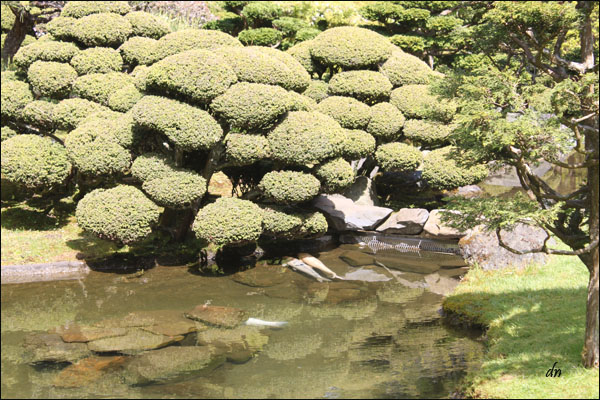
See also:
Next post: Japanese Tea Garden- II (Features and Symbolism)
A park so prim and proper – pictures from Japanese Friendship Garden in San Jose, CA.








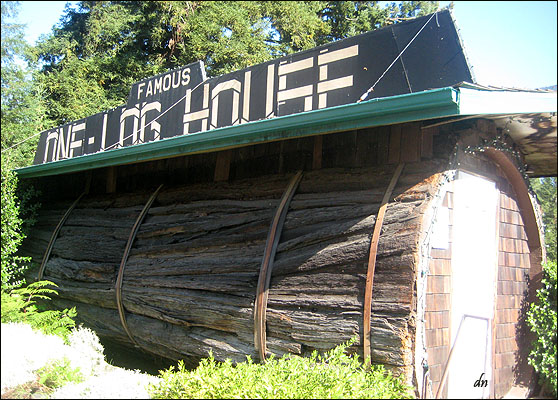




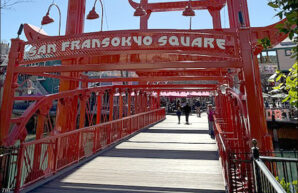

Great write-up
Thank you, Raghav.
That was a fascinating narration backed up with perfect photographs.
Thank you USP, there's more to come. 🙂
Beautiful photos, and well narrated too !
Thanks, Abhinav. Your dragonfly photograph is amazing.
lovely garden and an equally good post on it
Hey Sujatha, Thank you so much.
There's a lot more to see, come by again. The next post is going to be even better. 🙂
Avery informative post with beautiful pictures
Thank you, Seema.
Looks like a wonderful place to spend some hours in, may be doing zen meditations
It's beautiful. I guess all Japanese Gardens are :). This one has a Zen garden too; only I didn't get to see anybody doing some meditation there.
i ll come by again to read about the oldest Japanese garden. lots of information. nicely narrated 🙂
Please do, you're always welcome. Shall put it up soon, Deb.
A great write coupled with awe inspiring pics…wish I were there:)
Thank you. 🙂
Don't worry, Amit. I show you some California. Just keep coming by this blog 🙂
Beautiful it looks so neat enjoyed reading this post and love the pictures 🙂
Thank you Harsha. I wish I could take pictures like YOU 🙂
nice pics
Thank you, Shrinidhi. Visit again, ok 🙂
Nice to see this place …. Lovely pictures .
Thank you so much, Team G Square.
Wow, this looks like a mini Japan in SFO
Quite. There's a Japan town in SF. I should check it out sometime. I'd been to Chinatown once and was so impressed. I'm hoping Japantown will also be very Japanese. There's more to this Japanese Garden. Do come back and see it.
BTW Arnab, I'm waiting for part III of your Munnar Travelogue.
This place is on my wish list too. I couldn't make it here during my list trip to SFO. Now your amazing pics made me more anxious. Lovely write-up!!!
YOU made me want to see Niagara Falls. 🙂
There's so much to see in SF; so much to do too. Did you like what you saw of SF?
It was really nice reading about this and seeing the pics. I have read about this garden ages back, both in my reading about gardening, and in my reading on Buddhism in America. Will be looking out for the next post.
Wow, so you are into gardening as well? That's so cool.
Thank you so much Mr. Dasgupta. I'll put up the next post soon.
Thoroughly enjoyed the narrative with some very enticing pictures:) You did full justice to the Japanese Tea Garden!
Thank you Mr. Bhatia. 🙂
I love Japanese Gardens…this place looks awesome 🙂
Very pretty, aren't they, Suchi!
The third picture of the Pagoda reminded me of Kungfu Panda II, Kunfu Panda is my son's favorite animation which he watches 24×7 until unless we give him company to play something else…
Ha ha! I like the idea: either play with me or get bored watching Kungfu Panda again and again and again. :)So cute.
thank you for a wonderful virtual tour!!
It's my pleasure, Deepak. Thank YOU. 🙂
Thanks for the post, wonderful japanese design.
Here, a gallery in Paris, which has nice japanese art pieces.
[…] Sunken Garden, which lies in the site of the the former home of the Hagiwaras (read about them here). This part of the Tea Garden that is set on a lower level is now home to some miniature […]
[…] Previous post: Japanese Tea Garden – I (A Brief History) […]
[…] Posts: Japanese Tea Garden (SFO)- a brief history Japanese Tea Garden (features and […]
[…] Japanese Tea Garden (SFO)- a brief history Japanese Tea Garden (features and symbolism) […]
[…] Japanese Tea Garden in San Francisco […]
[…] in the Golden Gate Park:Japanese Tea GardenSculpture GardenOther:Things to do in San […]